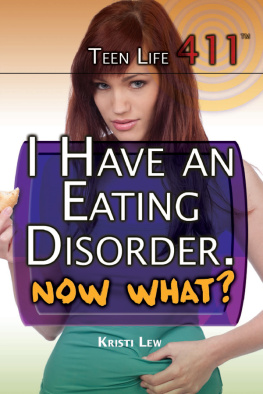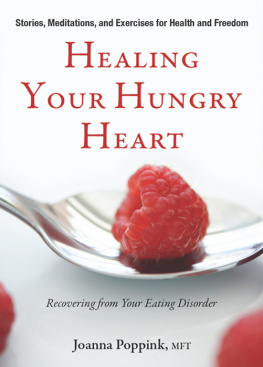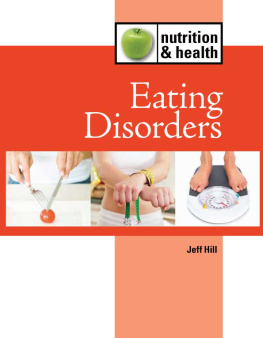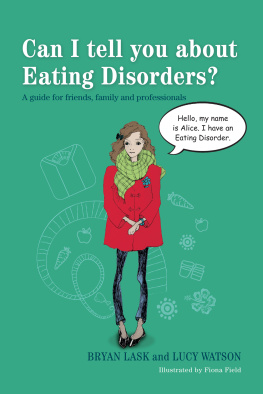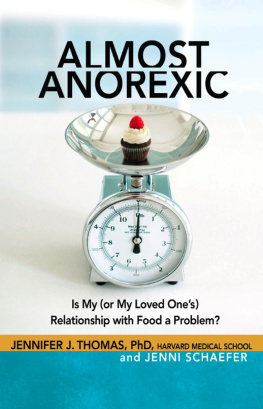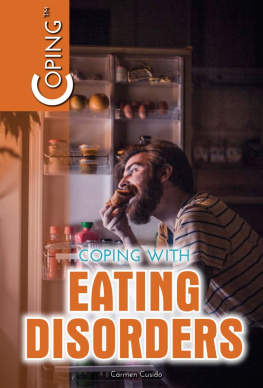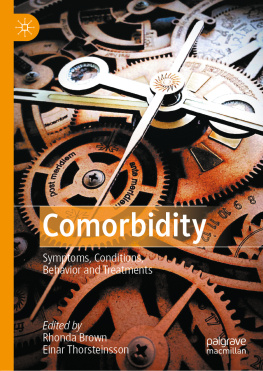Praise for Crave: Why You Binge Eat and How to Stop
More than 7 million Americans struggle with binge eating disorder (BED), according to a recent Harvard-based study, yet few of us know much about the condition Cynthia Bulik helps shed light on the problem.
Naomi Barr, O Magazine
A must-read if youve ever struggled with out-of-control eating or the weight gain so often associated with binge eating disorder.
Aimee Liu, author of Gaining: The Truth About Life After Eating Disorders
I applaud Dr. Bulik for tackling this complex subject in a practical, sensitive, and supportive way.
Tommy G. Thompson, former secretary of the Department of Health and Human Services
Dr. Buliks no-nonsense, easy to read, respectful, and clear approach is refreshing. Crave helps us all better understand the illness while providing concrete tools and hope for a successful recovery.
Lynn S. Grefe, CEO of National Eating Disorders Association ( www.nationaleatingdisorders.org )
Crave offers access to extraordinary clinical wisdom without the clinical distance.
Laura Collins, executive director of Families Empowered and Supporting Treatment of Eating Disorders ( www.FEAST-ED.org )
Dr. Bulik empowers people who struggle with binge eating disorder to take action. She offers her incredible insight and knowledge of eating disorders with compassion and understanding in order to help people reach the ultimate goal: Success.
Kitty Westin, president of Eating Disorders Coalition for Research, Policy & Action
Praise for The Woman in the Mirror: How to Stop Confusing What You Look Like with Who You Are
Bulik has a life-changing message for women and delivers it well.
Library Journal
This compelling account of how feelings about our bodies affect us throughout our lives is filled with inspiration and hope.
Susan Ringwood, chief executive of beat, the UKs leading charity supporting and campaigning for people with eating disorders
An untethered look at the reality of how both our biology and environment contribute to devastating eating disorders and other problems with self-image. Brava!
Chevese Turner, CEO, Binge Eating Disorder Association (BEDA)

Copyright 2013 by Cynthia M. Bulik, Ph.D.
All rights reserved. No part of this book may be used or reproduced in any manner whatsoever without written permission from the publisher except in the case of brief quotations embodied in critical articles or reviews. For information address Walker & Company,
175 Fifth Avenue, New York, New York 10010.
Published by Walker Publishing Company, Inc., New York
A Division of Bloomsbury Publishing
Library of Congress Cataloging-in-Publication Data has been applied for.
eISBN: 978-0-8027-4350-3
Visit Walker & Companys website at www.walkerbooks.com
First U.S. edition 2013
Electronic edition published in March 2013
This book is dedicated to my patients. I have learned more from you than any book could ever teach me. Thanks for placing your trust in me and allowing me to accompany you on your recovery journeys. Your personal stories continue to enrich my understanding of these disorders, inform my research, and inspire me to work toward better understanding, prevention, and cure.
DISCLAIMER
All matters regarding your health require medical supervision. This book draws on my decades of experience as a psychologist and director of eating disorders treatment and research programs. It is neither intended nor designed to replace the opinions of your health care professional.
I have used my own clinical experience and have incorporated the personal stories of many patients, partners, and health care providers into this book. To protect their privacy, I have used pseudonyms and, in some cases, for clarity or caution, combined experiences or commentaries into one character. Some of the vignettes and quotes in this book may be disturbing, but they reflect the reality of midlife eating disorders. The take-home message remains that recovery or, at minimum, improved quality of life is possible at any age. There is hope.
Introduction:
Erase All Stereotypes
When someone says eating disorder, what image do you conjure up? Chances are if you are like most people, you imagine a thin white upper-middle-class teenage girl. Surprisingly, you couldnt be more wrong. Whatever preconceived notions you may have about who suffers from eating disorders, its time to erase them and start over. Granted, anorexia nervosa is more visible than other eating disorders; those afflicted are strikingly underweight, may look pale, and may have other signs of the disorder such as dry skin and brittle hair. Pictures of someone with anorexia are shocking and attention-grabbing. The media love anything with a provoking visual hook. Thats why we are much more likely to read stories about anorexia in newspapers and magazines than stories about the less visual eating disorders such as bulimia nervosa or binge eating disorder (BED). Plus, people are more aware of the lethality of anorexia nervosa, and the media are always hot on the trail of any story about a celeb who dies, be it from anorexia nervosa, drug or alcohol abuse, or suicide. Most people are less aware that other eating disorders also carry a death toll. The landscape of eating disorders has changed and we have to update our understanding of what they are and who they afflict.
If we look at the numbers, the most common profile of someone with an eating disorder is a woman in her thirties or forties who struggles with weight control and suffers from BED. But countless women and men in midlife and beyond from all racial, ethnic, and socioeconomic backgrounds wake up each morning to an ongoing battle with eating and body image, with many suffering from anorexia nervosa, bulimia nervosa, purging disorder, BED, and night eating syndrome. Millions more lurk below the diagnostic radar with enough disordered eating to disrupt their lives, but not to receive an official diagnosis.
On the surface, eating disorders play out similarly in adults and teens, but the context and the impact on their own and their families lives differs enormously. Some adults with eating and body-image-related disorders live productive lives and carry their illness around with them like a hidden secret. For others, eating disorders remove them from the playing field of life, impairing their ability to work, reproduce, and love.
In the medical field, typecasting eating disorders as teen disorders poses dangerous challenges for adult women and men seeking compassionate care. Primary care physicians, obgyns, and other health care providers may overlook these disorders in adults or, even worse, demean women for not having grown out of these adolescent problems or ridicule men for having a girls disorder.
Partners and children suffer when adult women and men are afflicted. The cost of treatment renders families destitute and destroys relationships. Intimacy is crushed by body image concerns. Trust in relationships is shattered as women and men desperately try to hide their illness from others.
The treatments that we currently use were developed primarily for adolescent girls. We are only now starting to tailor treatments to deal with the specific challenges faced by adult women and men: how to recover when you have to work, engaging partners in recovery, developing parenting skills, and protecting the next generation.
Next page

